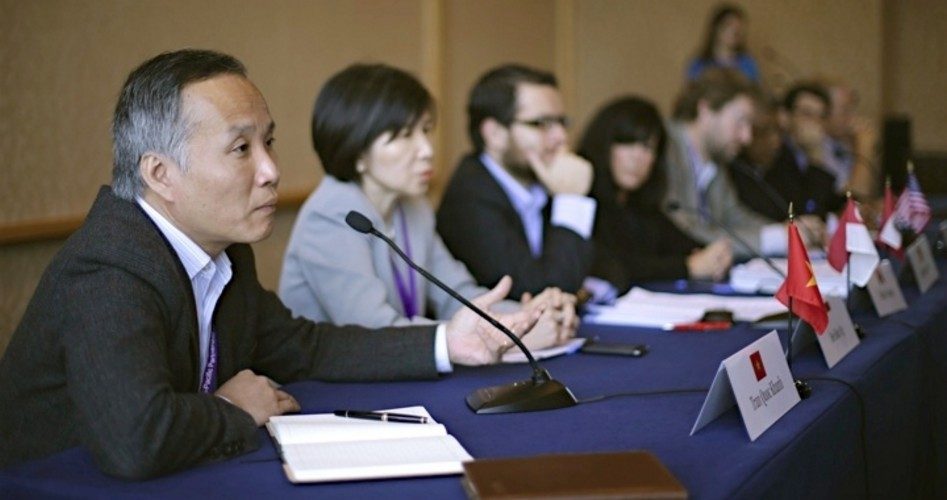
At the conclusion of the latest round of secret negotiations on the Trans-Pacific Partnership (TPP) held in Leesburg, Virgnia, leaders of the nine participating nations (Australia, Brunei Darussalam, Chile, Malaysia, New Zealand, Peru, Singapore, the United States, and Vietnam) published a report on their meetings.
First, the nine current members welcomed the entry of Mexico and Canada to the TPP, bringing the number of “stakeholders” to 11.
In a joint leadership statement released on September 9, the negotiators reported that they have agreed to “renew [their] efforts to conclude the negotiations expeditiously so that our manufacturers, service providers, farmers, ranchers, workers, and consumers can begin reaping as soon as possible the considerable benefits we anticipate from this agreement.”
Many concerned citizens and members of Congress worry that a multitude of the provisions being hammered out in these behind-closed-doors meetings are not beneficial and pose a potential threat to U.S. sovereignty and the freedom of the Internet.
In a letter sent to to the U.S. Trade Representative (USTR) Ron Kirk, Representative Darrell Issa (R-Calif.) and Senator Ron Wyden (D-Ore.) demanded that given the vast scope of U.S. law potentially impacted by the TPP agreement being worked out in secret, the American people have a right to be informed of the concessions being made by Kirk’s office.
“We insist that, as expeditiously as possible, the USTR provide to the public detailed information about what obligations (and exceptions) the USTR is seeking in the IPR [intellectual property rights] chapter.
As the Electronic Frontier Foundation (EFF) points out, the lawmakers’ letter specifically requests that the office of the USTR disclose any “impact on digital freedom” of the draft sections of the TPP agreement.
The Issa-Wyden letter reads:
Disciplines related to IPR could impact how people gain access to the Internet and could constrain what people may say online or how they can collaborate and share content. It is imperative that the IPR chapter of the proposed TPP agreement not inappropriately constrain online activity. Poorly-constructed IPR disciplines that erode Internet freedom could impede innovation, economic growth, and speech.
Issa and Wyden are right to worry. The Trans-Pacific Partnership (TPP) is effectively rewriting the law for the United States, particularly in the area of intellectual property.
Among the many problems with shrouding the details of such a binding agreement behind a thick veil of secrecy is the fact that if the TPP is approved by the Senate, many would assume that the provisions of the agreement then become “the supreme law of the land” and would demand that the laws of the United States be subject to approval by an international body that is unelected and unanswerable to the people of the United States.
Now it is discovered that the chapter on intellectual property in the leaked TPP draft agreement launches another attack on U.S. sovereignty through the mandate that member nations enact regulations that requiring Internet Service Providers (ISPs) to privately enforce copyright protection laws.
These private companies — many of which are very small — would be forced to take upon themselves the responsibility of patrolling for and punishing any violation of the copyright laws by their subscribers.
Current U.S. law, specifically the Digital Millennium Copyright Act (DMCA), would be supplanted by TPP Article 16.3. This provision in the TPP draft document paves the way for a new copyright enforcement scheme that extends far beyond the limits currently imposed by DMCA. In fact, it contains mandates more expansive than even those proposed in the Anti-Counterfeiting Trade Agreement (ACTA).
ACTA is widely regarded as a threat to Internet freedom, as well as to the legislative power of the Congress. If ACTA is a threat then TPP is an all-out frontal assault.
Regardless of the merits of the DMCA, it is U.S. law and should not be subject to de facto appeal by the work of a body of internationalists who are not accountable to citizens of the United States.
Apart from the issues of sovereignty, putting such pressure on service providers is a threat not only to the owners of these small businesses, but also to Internet freedom, as well.
It is the good work of these ISPs that has created the Internet we know today. Were it not for the typically low-cost access these companies provide, the pool of readily accessible viewpoints, opinions, and news resources would be significantly shallower.
In a post-TPP world, ISPs would be forced to raise prices dramatically in order to cover the increase in their own overhead brought on by the requirement that they monitor and manage the websites they host.
Alternatively, there would undoubtedly be a large number of ISPs who would not only want to avoid the administrative burden of being forced into the role of Internet cop, but who would also rightly regard the risks of providing Internet access as outweighing the benefits.
As any news organization that maintains a Web presence knows, in the posting of news items, time is of the essence. If the regulations of the TPP become the law, then ISPs would be forced to remove immediately any subscriber content posted online that is challenged by someone claiming a copyright infringement. This broad expansion of copyright protection could be devastating to a news organization (or blogger, for that matter) depending for their economic survival on the timeliness of their online stories and on the availability of those stories to the millions of Internet users.
Such procedures bypass the U.S. court system and the Constitution by abolishing the due process owed to those accused of crimes. Rather than require a person to present evidence of an alleged violation of a copyright to an impartial judge, the TPP would allow someone to demand that the outlet’s ISP immediately remove the content in question.
Any legal proceedings on the merits of the charges would occur after the damage has been done.
Critics understand that this redrawing of the boundaries of copyright law by the globalists secretly deliberating and drafting the TPP is an attack on our laws, our courts, our freedom of expression, our Constitution, and our sovereignty.
The TPP trade ministers’ report corroborates the fear of many concerned citizens, small-business owners, Internet service providers, intellectual property owners, and elected representatives that the ultimate aim of the TPP and similar multi-national agreements is the integration of the economies of the United States and other less-developed partner nations.
The nine leaders declare in their report:
While our nine countries have different approaches to some of these issues, we are working closely and constructively to find compromises so that we can ensure this agreement will promote synergies between our economies and raise living standards for our people.
Synergy of this sort spells the end of sovereignty and the eradication of American exceptionalism.
Photo: Vietnamese trade official Tran Quoc Khanh, left, speaks during a news conference at the Trans-Pacific Partnership Free Trade Agreement talks July 10, 2012, in San Diego: AP Images



